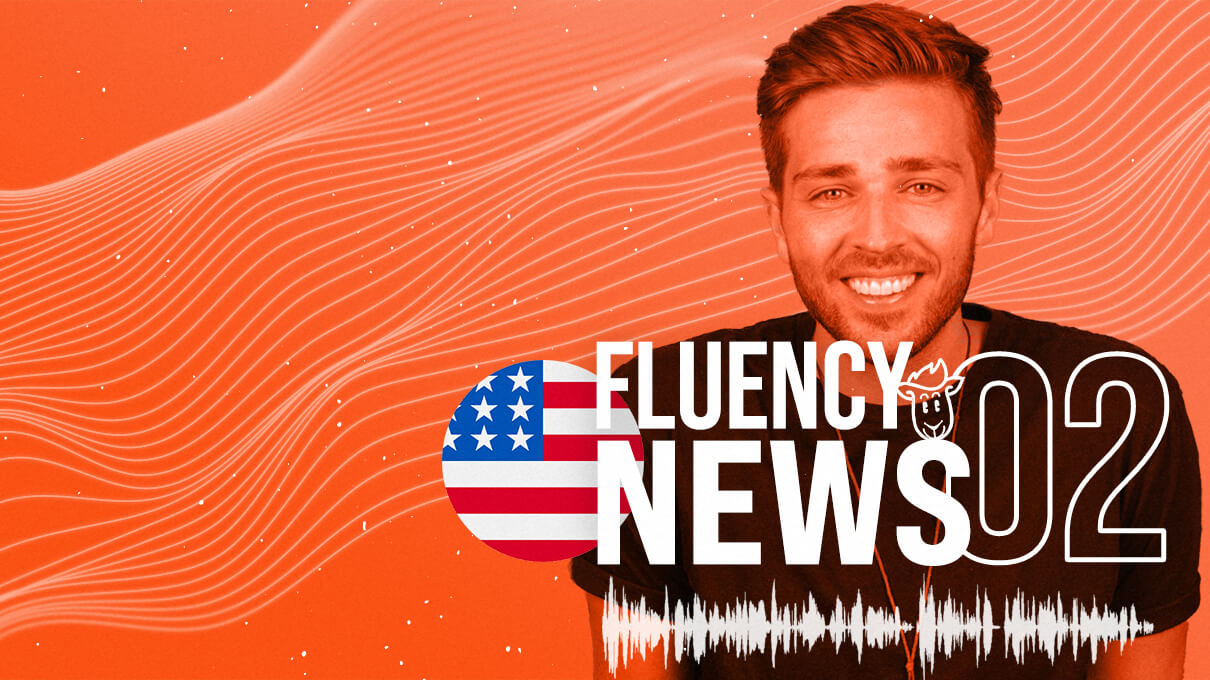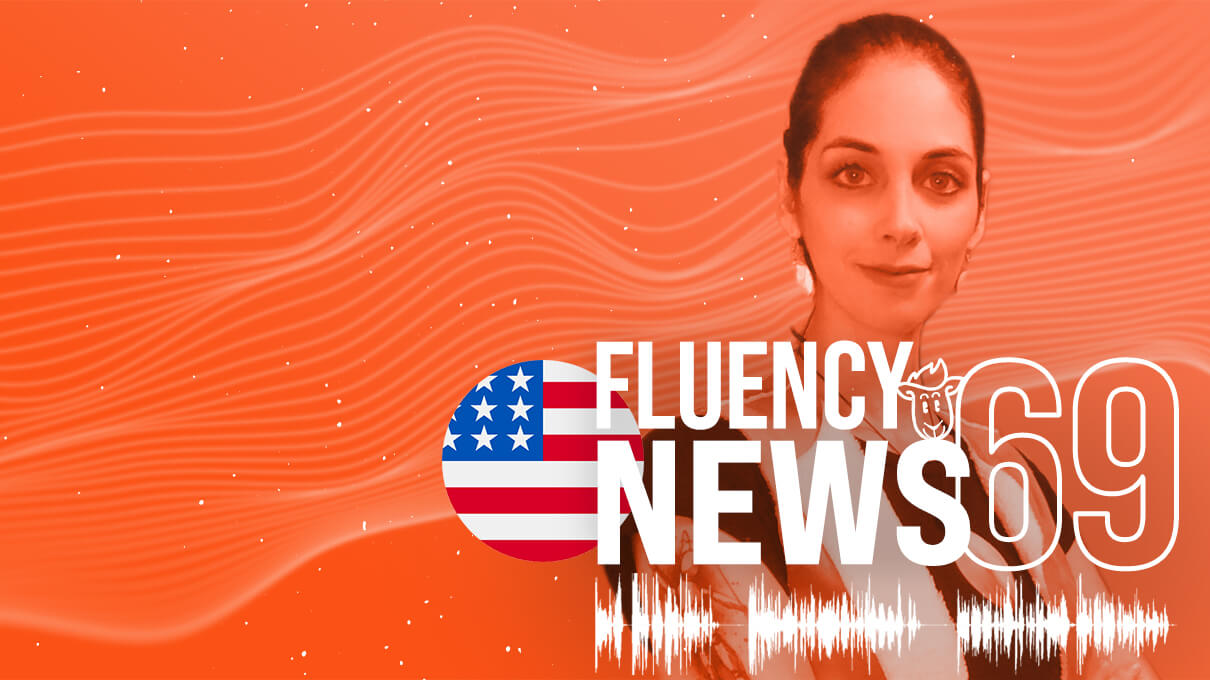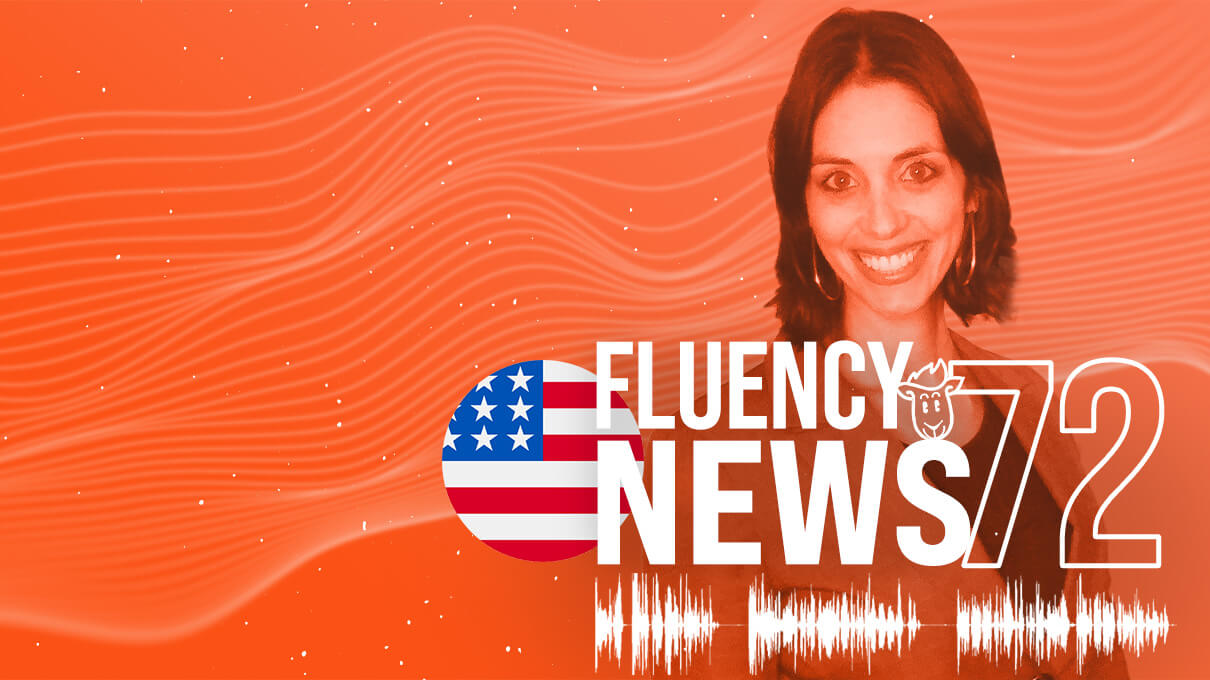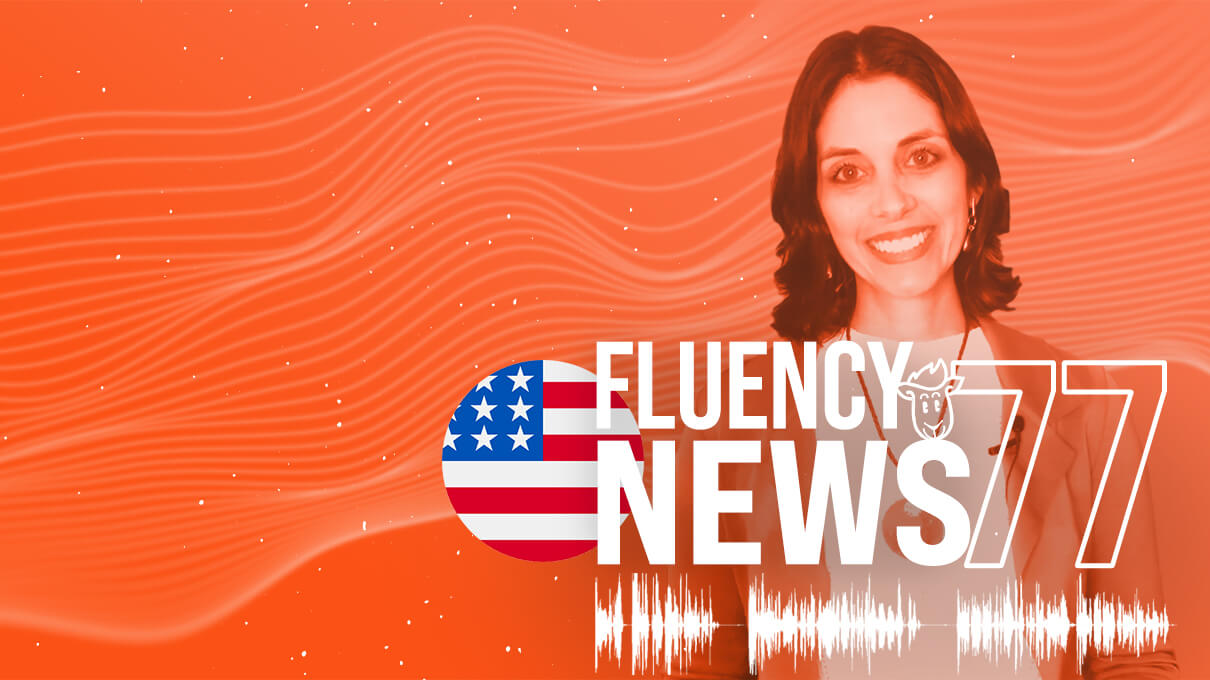Fluency News 23

Descubra as principais notícias da semana e pratique seu inglês com o Fluency News!
Navegue pelo conteúdo
Hello, everyone!
Sejam bem-vindos e bem-vindas a mais um episódio da nossa nova série de podcasts, o Fluency News! Aqui, você vai treinar a sua escuta e ficar por dentro do que está acontecendo no mundo, sempre com as três principais notícias da semana, tudo em inglês! Ao longo do episódio, nós também adicionamos explicações em português das coisas que achamos que precisam de mais atenção, assim você não perde nenhum detalhe!
No episódio de hoje, falamos sobre a situação de Myanmar com o recente golpe de Estado, sobre a Tesla comprar U$1,5 bilhão em bitcoin e sobre a mulher que está transformando plástico em tijolos mais resistentes do que concreto. Nós também damos um update sobre a vacinação contra a COVID-19 ao redor do mundo!
Nós temos uma página de dicas de inglês no Instagram, vá conferir! @fluencytvingles
Toda semana temos um novo episódio do Fluency News, não deixe de escutar! See you!
Este episódio foi escrito por Lívia Pond.
Transcrição do episódio:
What is up, everyone! Welcome back to Fluency News! I’m Scott Lowe, one of the teachers at Fluency Academy. We created this podcast thinking of a way for English learners that are more advanced to have a way to continue practicing their skills, while being an informed citizen of the world.
Don’t forget to check out fluency.io for the sources of all our stories, the transcript of this episode and over a THOUSAND lessons in five different languages taught by more than 40 of the best teachers in the world. And all of that is free! 100% free! That’s absolute madness!
If you’re listening to us challenging yourself to understand everything, welcome! It’s great that you’re here, working on improving yourself. And if you’re satisfied with your skills and you’re just here for the news, that’s okay too! We choose our stories carefully, making sure we cover different subjects in different places of the world.
Between stories, you’ll hear me speaking Portuguese, if we feel something needs special attention or a detailed explanation. Alright, now let’s get started!
Our first story today comes from Myanmar, a country in southeast Asia, bordered by India, Bangladesh, China, Laos and Thailand. Last week, the military seized power, arrested the president elect and handed power over to Gen Min Aung Hlaing, ending a decade of partial civilian rule and triggering international condemnation.. Min Aung Hlaing said November’s election, won in a landslide by the party of detained elected leader Aung San Suu Kyi, had been unfair.
The military has begun to impose restrictions in some areas, including curfews and limits to gatherings.
Huge protests were held on Monday for a third straight day, along with a nationwide strike, to oppose the coup.
One demonstrating doctor – who did not want to be named – told the BBC: “Today, we, professionals – especially civil servant professionals such as doctors, engineers and teachers – came out to show that we are all together in this. Our objective is the same – to make the dictatorship fall.”
The general’s speech drew angry opposition, with images on social media showing people banging pots and pans in protest in front of television screens.
The military seized power last week and declared a year-long state of emergency in Myanmar, also known as Burma, with power handed over to Gen Min Aung Hlaing.
Ms Suu Kyi and senior leaders of her National League for Democracy Party (NLD), including President Win Myint, have been put under house arrest.
An Australian economic adviser to Ms Suu Kyi, Sean Turnell, has also been detained and on Monday his family posted a statement on Facebook calling for his immediate release.
Gen Min Aung Hlaing has referred to discrepancies in the voter rolls as justification for the coup.
The Myanmar army says it has uncovered more than 10 million examples of irregularities on the voter lists, including duplicate entries or individuals registered without national identification numbers.
But the country’s election commission has rejected the claims.
Independent observers acknowledge there may have been mistakes on the lists, but claims of deliberate fraud have not been supported by evidence.
The US-based Carter Center, which had more than 40 observers visiting polling stations on election day, said voting had taken place “without major irregularities being reported”.
There were safeguards to stop people voting twice, such as indelible ink on fingers. The election commission also pointed to strict Covid restrictions preventing travel, making it extremely hard to vote in multiple locations.
Martial law was declared in parts of Myanmar’s second-largest city Mandalay on Monday (Feb 8), after hundreds of thousands rallied across the country against the coup and the military issued a stern warning against further protests.
The orders cover seven townships in Mandalay, banning people from protesting or gathering in groups of more than five, and a curfew will run from 8pm until 4am, the general administration department said in a statement.
A similar declaration has been made in a township in Ayeyarwaddy further south and announcements concerning other localities are expected to trickle out tonight.
“This order is applied until further notice,” one Mandalay township statement said.
“Some people … are behaving in a worrying way that can harm the safety of public and law enforcement. Such behaviours can affect stability, safety of people, law enforcement, and peaceful existence of villages and could create riots, that’s why this order bans gathering, speaking in public, protest by using vehicles, rallies,” the statement said.
The movement built on Monday, with protests across the country and the start of a nationwide strike.
In Yangon, the nation’s commercial capital, crowds spilled onto the city’s main roads, immobilising traffic and dwarfing the previous day’s rally.
“Down with military dictatorship” and “release Daw Aung San Suu Kyi and arrested people”, protesters chanted, flashing the three-finger salute that has come to symbolise their movement as car horns were honked in support.
Calls for a nationwide strike gathered momentum over the weekend, with textile workers, civil servants and railway employees walking out of work in the commercial hub.
“This is a work day, but we aren’t going to work even if our salary will be cut,” one protester, 28-year-old garment factory worker Hnin Thazin, told AFP.
Construction worker Chit Min, 18, joined the Yangon rally, saying his loyalty to Suu Kyi outweighed concerns about his financial situation.
“I am jobless now for a week because of the military coup, and I am worried for my survival,” he told AFP.
Similarly large crowds marched in Mandalay, the country’s second-largest city, many clutching photos of Suu Kyi and waving the red flags of her party.
Police attempted to disperse thousands of people gathered on a highway in Naypyidaw, where the deposed leader is believed to be detained.
Water cannon was fired into the crowd, injuring at least two demonstrators, according to a photographer on the scene.
Huge rallies were also reported across much of the country, from Muse on the Chinese border to the southern cities of Dawei and Hpa-an.
Protesters started to disperse in the early evening.
US President Joe Biden has led global calls for the generals to relinquish power.
Pope Francis on Monday called for the prompt release of imprisoned political leaders.
“The path to democracy undertaken in recent years was brusquely interrupted by last week’s coup d’etat,” he told a gathering of diplomats.
“This has led to the imprisonment of different political leaders, who I hope will be promptly released as a sign of encouragement for a sincere dialogue.”
South East Asian lawmakers have also urged Myanmar’s military to respect the people’s rights to protest.
“As peaceful demonstrations grow, the risk of violence is real. We all know what the Myanmar army is capable of: mass atrocities, killing of civilians, enforced disappearances, torture, and arbitrary arrests, among others,” Tom Villarin from ASEAN Parliamentarians for Human Rights said.
É comum que os idiomas peguem emprestado palavras de outras línguas, e as insiram no seu vocabulário. Em português, nós temos exemplos como as palavras marketing, design, fashion e drive thru. O mesmo acontece com o inglês. A expressão “coup d’etat” é francesa, e pode ser traduzida para golpe de estado. Existem outros exemplos, como avant-garde, deja-vu, e facade. No momento, a estimativa é que mais de 7000 palavras do francês sejam usadas no inglês, e mais de 10000 tenham sua origem no país da Torre Eiffel.
Now let’s talk about how the vaccination against COVID-19 has been happening. In most countries, the first dose of the vaccine has been administered. In Brazil, almost 4 million people received the first dose, and although the numbers seem high, it represents less than 2% of the population. Israel and the United Arab Emirates lead in the highest percentage of the population being vaccinated, over 40% in each country. Italy, Spain, Germany and France average almost 3% of the total population that received at least one vaccine dose.
The United States have administered over 42 million doses, China is not too far behind, with over 31 million doses, and the United Kingdom is close to reaching the 13 million mark.
The COVAX initiative for equitable global access to COVID-19 vaccines has published its first distribution list, planning enough doses for dozens of countries to immunise more than 3 percent of their populations by mid-year.
First deliveries are expected in late February, with some 145 countries set to receive enough doses to immunise 3.3 percent of their population by mid-2021. Countries will receive doses in proportion to population size, with the most going to India (97.2 million), Pakistan (17.2 million), Nigeria (16 million), Indonesia (13.7 million), Bangladesh (12.8 million) and Brazil (10.6 million).
In the description of this episode, you’ll find links to more data, in case you want to dive in.
A palavra “some” tem alguns significados diferentes. Pode ser que você não esteja familiarizado com o uso dela nessa notícia, quando dizemos “with some 145 countries”. O uso mais comum dessa palavra pode ser traduzido como “alguns”, “algumas”, mas no exemplo que temos aqui, essa tradução não faz sentido, certo? Acontece que ela também pode ser usada para indicar um número incerto, ou uma aproximação. Nesses casos, ela pode ser substituída por “around”, sem que o significado seja alterado.
In some quickie news, Tesla bought $1.5 billion in bitcoin, and plans to accept it as payment. Tesla says it has invested $1.5 billion in the bitcoin cryptocurrency. The electric car manufacturer filed its annual 10-K report with the SEC this morning, and revealed the new bitcoin investment. Tesla says it will also “begin accepting bitcoin as a form of payment for our products in the near future.”
Tesla customers have been calling on founder and CEO Elon Musk to accept bitcoin for vehicle purchases recently. Musk has been vocal about backing the cryptocurrency on Twitter, even adding #bitcoin to his profile recently. Musk has also been backing Dogecoin on Twitter over the past week, sending its value up just moments after his tweets.
News of the Tesla investment has sent the price of bitcoin up to more than $43,000 this morning, breaking its all-time high. The price of the cryptocurrency has been gradually increasing throughout 2021, as demand from both institutional and retail buyers has increased. It still remains a volatile cryptocurrency, though, with the price dipping below $30,000 in January alone.
And finally, to end todays episode, let’s, as always, take a look at something good happening around the world! A Kenyan woman found a way to recycle plastic waste into bricks that are stronger than concrete.
Using her ingenuity and engineering skills, Nzambi Matee found a way to help the environment by converting plastic waste into building materials.
In 2017, Matee opened a factory in Nairobi called Gjenge Makers, where workers take plastic waste, mix it with sand, and heat it up, with the resulting brick being five to seven times stronger than concrete. The factory accepts waste that other facilities “cannot process anymore, they cannot recycle,” Matee told Reuters. “That is what we get.”
The bricks are made of plastic that was originally used for milk and shampoo bottles, cereal and sandwich bags, buckets, and ropes. Every day, Gjenge Makers produces about 1,500 bricks, in different sizes and colors. Matee is a materials engineer, and she designed the factory’s machines after becoming sick of waiting for government officials to do something about plastic pollution. “I was tired of being on the sidelines,” she told Reuters.
Since opening, Gjenge Makers has recycled 20 tons of plastic waste, and Matee plans on adding a larger production line that will allow the factory to triple its output.
Isn’t that some awesome initiative?
A palavra “sidelines” é outra com diferentes significados, podendo ser usada como um verbo ou um substantivo. Como substantivo, pode significar uma atividade feita em adição à outra, como uma forma alternativa de ganhar mais dinheiro. Como verbo, significa tirar algo de foco, colocar à margem ou em uma situação ou posição menos importante. O que Matee quis dizer, nessa história, é que ela estava cansada de estar em uma situação em que não podia ajudar, à margem, deixada de lado.
Alright, that is it for today, everyone!
If you had too much trouble or it was too difficult to understand everything we talked about here, I recommend you go to fluency.io, where you can read the transcript of this episode. Sometimes, listening and reading at the same time can make your brain understand things better. But make sure that you only do it after hearing the episode once, ok? It’s important that you keep challenging yourself.
E pra todo mundo perguntando se temos vagas abertas na Fluency Academy, infelizmente todas elas estão preenchidas! Então se você quiser aprender não só inglês, mas também espanhol, francês, italiano, alemão, japonês ou até mesmo mandarim, inscreva-se de graça na nossa lista de espera. De vez em quando nós abrimos algumas vagas out of the blue – do nada, então se você não quiser perder a oportunidade, clique no link na descrição para ser avisado! É super rápido, leva 15 segundinhos.
Alright, this is where I’m going to end this week’s episode. I hope you’re having a great week, and I’ll see you next time. Peace out.
Fontes:
Myanmar coup leader defends action amid mass protests
https://www.bbc.com/news/world-asia-55975746
https://apnews.com/article/world-news-aung-san-suu-kyi-myanmar-riots-yangon-745e8a7c0f39bd1317706307fb39c3ed
https://www.aljazeera.com/news/2021/2/8/in-myanmar-protesters-urge-police-to-join-democracy-fight
https://www.channelnewsasia.com/news/asia/martial-law-parts-myanmar-protests-military-coup-mandalay-14140170
https://www.theguardian.com/world/2021/feb/08/three-finger-salute-hunger-games-symbol-adopted-by-myanmars-protesters
Vaccines updates
https://www.nytimes.com/interactive/2020/science/coronavirus-vaccine-tracker.html
https://ourworldindata.org/covid-vaccinations
Tesla invests U$1,5b in bitcoin
http://ansabrasil.com.br/brasil/noticias/brasil/tecnologia/2021/02/08/tesla-anuncia-investimento-de-us$-15-bilhao-em-bitcoin_c371fdf1-e620-4303-aff0-e57349facbd5.html
https://www.theverge.com/2021/2/8/22272103/tesla-bitcoin-investment-1-5-billion-cryptocurrency-payments
https://www.cnbc.com/2021/02/08/tesla-buys-1point5-billion-in-bitcoin.html
Kenyan recycles plastic waste into bricks stronger than concrete
https://www.reuters.com/article/us-kenya-environment-recycling-idUSKBN2A211N?utm_source=reddit.com
https://www.yahoo.com/now/kenyan-woman-finds-way-recycle-053411779.html?guccounter=1&guce_referrer=aHR0cHM6Ly93d3cuZ29vZ2xlLmNvbS8&guce_referrer_sig=AQAAALHvXBhkFtuoYO_WsqdKzs8-3fokxd1bXBTzx3WZQj_XXYslH_S7FRfqxFj8-Z0277M30F-YPp0F_V9F8lkeE6C_TQPFjlkS5B6UjHJvhylJcYs__U47Ewwla7mcRO0n_gET3SfT69txvqJeVX21lbygrDQdzSW7GtuL2FM9zUe2
Playlist














































































































 Blog
Blog  Podcast
Podcast  Lives
Lives  Aulas
Aulas  eBooks
eBooks  Minicursos
Minicursos











